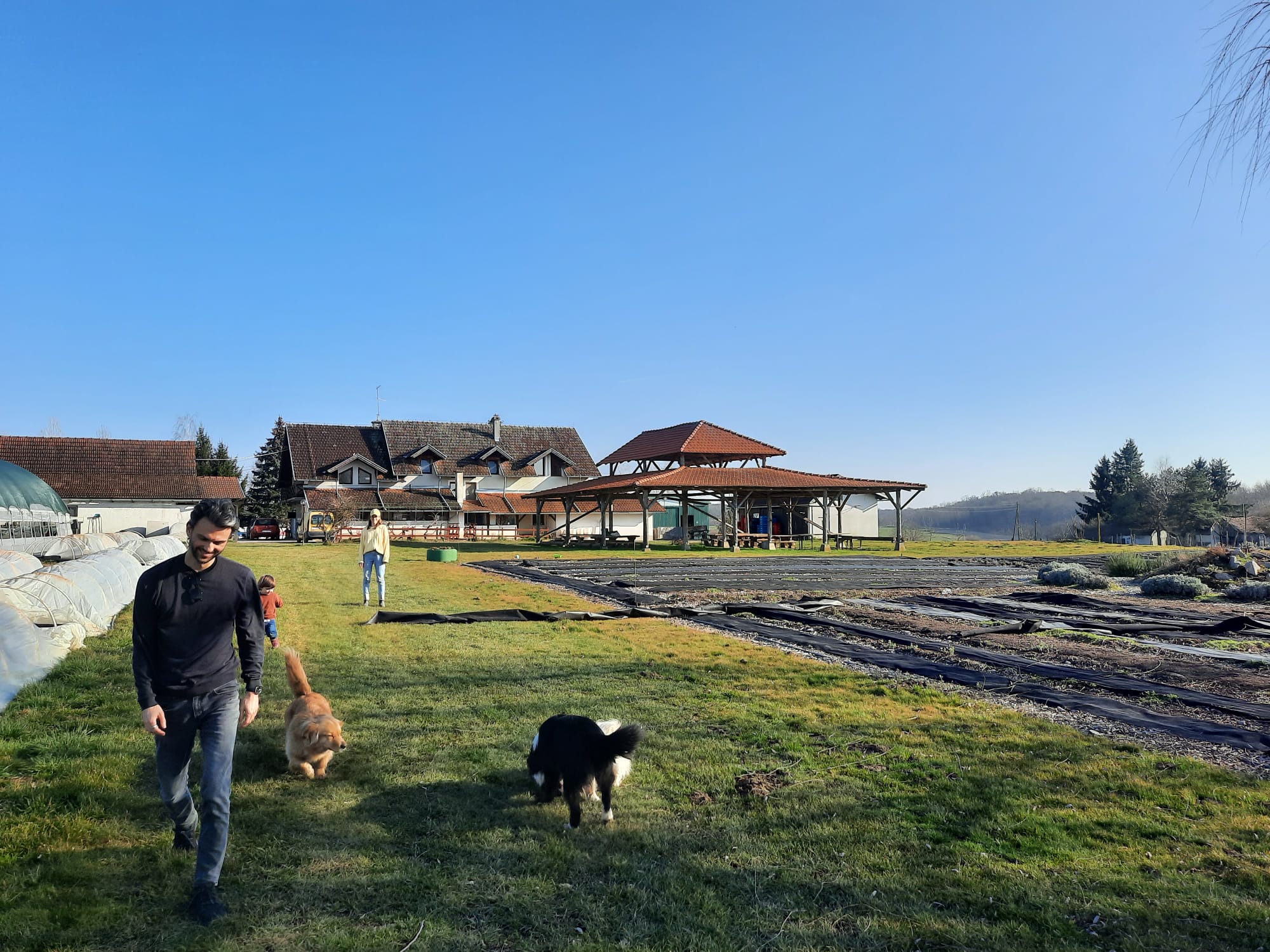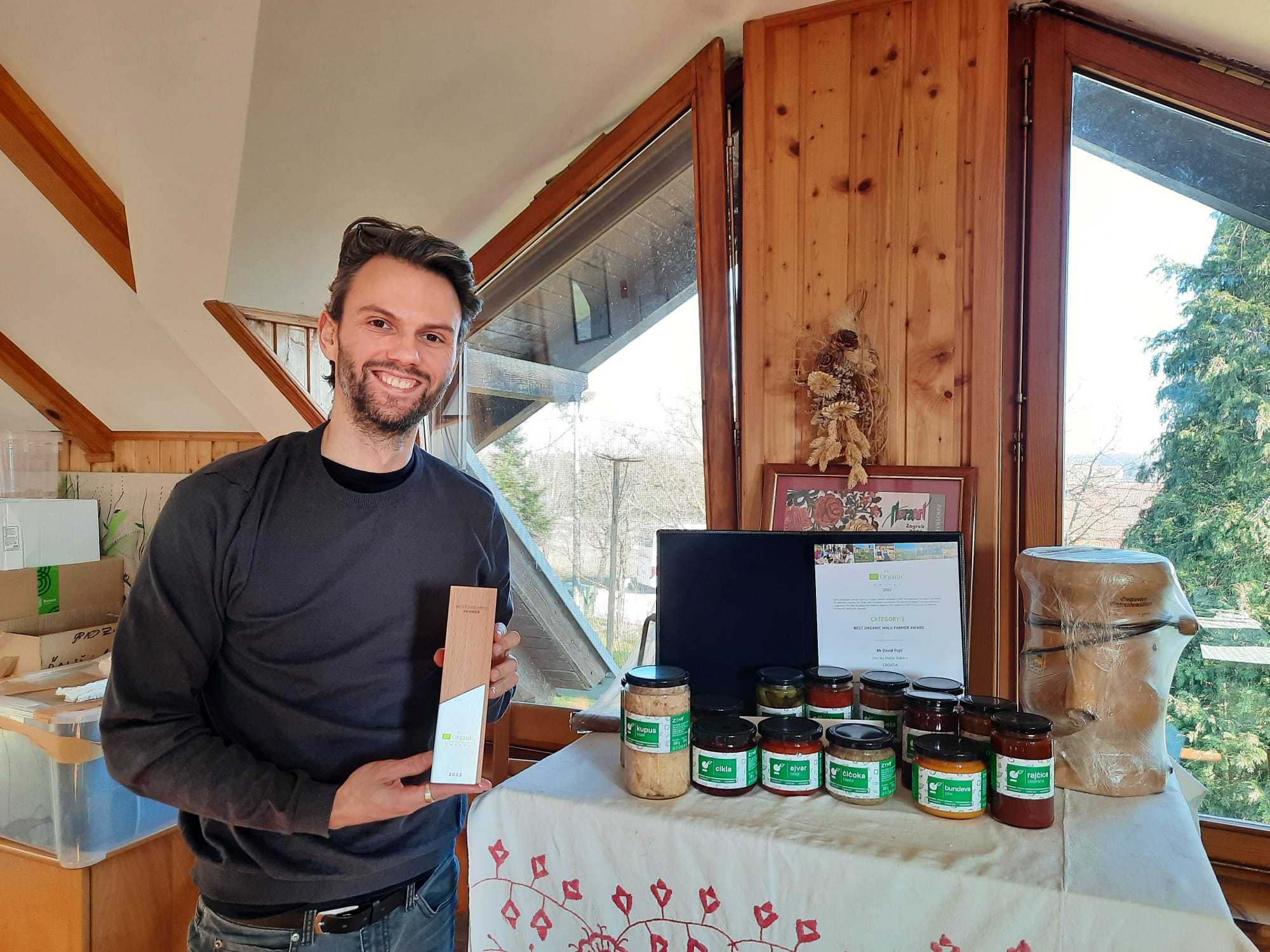
David Pejić at his organic farm Zrno Eko Imanje in Habjanovac (photo G. Vale)
David Pejić, born in 1990, won the European Commission award for "Best European organic farmer" last September. David is at the helm of the oldest organic farm in Croatia and his is a very unusual story that crosses agriculture and philosophy
Spring has not yet begun when we meet David Pejić at his Zrno Eko Imanje organic farm in Habjanovac, 60 km east of Zagreb. The seedlings, recently sown, grow in the greenhouse and wait to be transferred outside, as soon as winter is completely behind us. We are on the oldest organic farm in Croatia and our guide, David Pejić, is none other than the "Best European Organic Farmer", winner of the prize of the same name assigned – for the first time – by the European Commission in September 2022.
“I think the Commission wanted to reward above all the fact that we managed to create a complete and closed cycle, which includes not only agricultural production, but also the processing and transformation of food, up to the use of our products in the vegan restaurant we have in Zagreb2, explains David Pejić, born in 1990. Zrno is in fact much more than a simple farm. In addition to growing 60 different varieties in fields and greenhouses, the company also has a food processing and bakery production plant, as well as the first vegan restaurant in Croatia. In all, we're talking about 150 certified ecological products. “For example, we grow soybeans, with which we produce our tofu, which we use in sandwiches and in the dishes served at the restaurant”, continues David. The cycle is reasoned. “We wouldn't have enough space to produce wheat and therefore our flour, so we buy that from cooperators in the area. But for everything else, for everything we can grow here, we are self-sufficient”, he explains.
From Cambridge to the fields
The story of David Pejić is interesting not only for the results achieved by this family business, which opened in 1988 and where today 40 people work (about ten of them in the restaurant), but also for the biography of the young farmer himself. Before returning to Croatia to work in the family business, David studied cinematography in New York and philosophy in Cambridge. In 2015, after completing his master's degree in England, he returned to Zagreb with the intention of helping his parents in the family business. “Given my studies, I should have perhaps dealt with marketing, but I preferred to ask my parents: where am I most needed? And they told me: Zrno, the farm”, says David. In fact, the family also owns other companies in the organic world: Biovega, which manages the Bio&Bio supermarket chain (about twenty shops throughout the country), Makronova, which deals with training, and Planetopija, a publishing house specialising in nutrition and well-being in general.
“My parents bought Zrno in 2010 and started all the other businesses when I was born, so I grew up in this ecosystem and I always gave a lot of importance to this job, I wanted to be part of it”, continues David Pejić. “When I started here, at first I spent most of my time in the fields and I saw the connections between agriculture and philosophy”, says David, “at university I was interested in complex systems and the farmer constantly interacts with the complex system of nature. You can have a good idea, be right, and execute it well, but the results can still be unexpected. This is especially true for organic farming, where you don't control everything, you don't reduce nature”. After seven years at the helm of Zrno, David Pejić is now much more often in the office, directing the various sectors of the family business. The experience allows him to look at the Croatian and European context and sketch out some analyses.
A new way for agriculture?
“There is certainly more awareness today, even in Croatia, of the importance of what we eat, but confusion and distrust are still great. We lack consistent institutional support and a long-term political vision of the type of agriculture we want to develop”, argues the young farmer. “Croatia is well placed for organic farming and all the necessary prerequisites to make it in this sector – starting for example from the fact that its economy depends a lot on tourism, which goes well with healthy and organic local food products – but will we go in this direction? I do not know". In 2019, 8.5% of agricultural land in the European Union was farmed organically. The Commission has set itself the goal of reaching 25% by 2030, but not all member states are proceeding at the same pace. "Latvia is aiming for 30% by 2030, while the Croatian government is satisfied with 14%", says David regretfully.
“Today we are all aware of the negative consequences of conventional agriculture on human health and the environment. A recent American study showed that in California, 80% of the people involved in the test (3,000 people in all) had glyphosate residues in their urine. Two thirds of these were children”, says the director of Zrno, who adds that “unfortunately, however, we are not going in the right direction, the use of pesticides is increasing instead of decreasing”. Organic agriculture, in this sense, would help chart a new way forward, because at the moment "as a civilisation, we have managed to transform something that should nourish us into something that hurts us". This, if nothing else, is the commitment of David Pejić, who in Habjanovac introduced the concept of a bio-intensive vegetable garden – a cultivation method that combines the principles of organic farming with a high density and diversity of planted species – and has plans to expand the buildings available to the company.
«In the United States there is the largest return to agriculture since the 1960s and it is precisely organic agriculture that is driving it. I've never heard of a young man leaving the city to move to the countryside and do traditional farming”, comments David. Even in Croatia, where the cost of agricultural land is affordable for many, there is no shortage of such stories. For David Pejić, the phenomenon is understandable. “We are not equipped to live at this pace, with this complexity and speed. We simply cannot physically and mentally make it. Instinct tells us to start from the city, to seek more simplicity. It's not about idealising life in the countryside, which isn't easy, but about surviving in today's world”, concludes David.
Fondi Ue per l'agricoltura in Croazia
Under Croatia's Cohesion Policy 2014-2020, support was foreseen for the agricultural small and medium-sized enterprise sector. For example, in August 2022, the Zrno Eko company concluded the construction of a solar park with a power of 19.5 kW, through the Croatian Rural Development Programme , co-financed 85% by the EU and 15% by the Croatian ministry.
Recently, Agriculture Minister Marija Vučković announced the signing of 81 new financing agreements with European funds for small and medium-sized agricultural enterprises under the ongoing Rural Development Programme, for a value of 11.1 million Euros.
Also, she announced future availability of another 3.8 billion Euros under the "Strategic Plan of the Common Agricultural Policy of the Republic of Croatia - 2023-2027 ", approved by the European Commission in October 2022.
This content is published in the context of the "Work4Future" project co-financed by the European Union (EU). The EU is in no way responsible for the information or views expressed within the framework of the project. The responsibility for the contents lies solely with OBC Transeuropa. Go to the "Work4Future"







 To Top
To Top